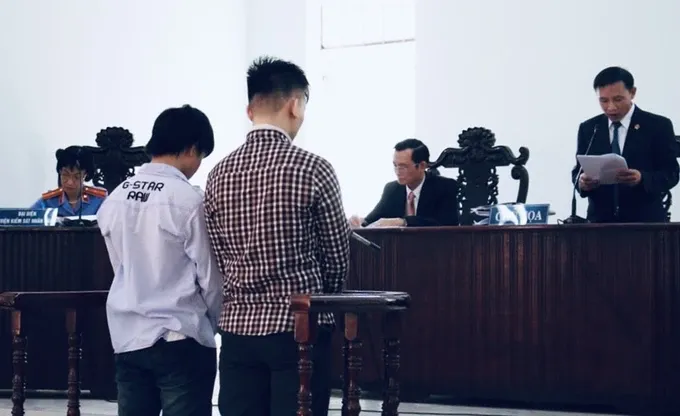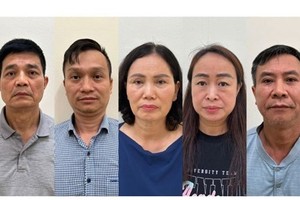
On September 15, the Family and Juvenile Court (under the HCMC People’s Court) held an appellate trial for the case of bread snatching involving defendants On Thanh Tan (born in 1998, residing in District 9 - now Thu Duc City) and Nguyen Hoang Tuan (born in 1998, residing in Cu Chi District). Driven by hunger, the two minors had snatched food from a grocery store, with the stolen goods valued at VND45,000 (US$1.77). At the time of the offense, both were under the age of 18.
The public raised questions about why two children were criminally prosecuted for stealing a mere loaf of bread. According to the law, "snatching property" is the act of publicly and swiftly taking possession of another person's property. It is a crime with a formal procedure and is considered complete when the offender snatches the property from the owner's control. Unlike "theft", "snatching property" does not specify a minimum property value for criminal prosecution. Therefore, the value of the property taken is not a constitutive element of the crime of "snatching property."
However, the People’s Supreme Court had instructed the HCMC one to carefully consider an appropriate punishment for these juvenile criminals in order to prioritize education so that they clearly realized their wrongdoings and would not repeat those acts in the future. In all cases, state agencies must sensibly determine the danger level, the root and conditions of the crime before imposing a punishment. When it is unnecessary to impose a criminal penalty on the juvenile offender, the court shall apply one of the judicial measures provided for in Article 70 of the Criminal Code.
It was an unforgettable moment when both Tuan and Tan broke down in tears of joy expressing their gratitude to the panel of judges for being exempted from criminal liability 8 years ago.
At that time, Tuan’s father had died and his mother remarried, yet the step-father abandoned the family, forcing the mother to leave both Tuan and his brother under the care of the grandmother to earn a living far away. Inadequate education from family had shaped some distorted thoughts in him.
After the trial, Tan received financial support from the Youth Union of District 9 (now Thu Duc City) to learn necessary skills for an IT job. He joyfully promised to pursue this course and become a useful person in the community.
Obviously appropriate punishment and community support are the key to reintegration for juvenile offenders. Le Thi Anh Nga, lecturer from the HCMC University of Law explained that the core in juvenile delinquencies are a lack of knowledge and inability to control both feeling and behaviors.
To prevent this crime type, Ms. Nga emphasizes the importance of prioritizing restorative justice policies. These policies aim to provide timely education and support to guide juveniles back onto the right path, helping them overcome feelings of guilt and shame, and instill confidence in their inherent goodness to strive towards becoming responsible citizens.
The draft Juvenile Justice Law aligns with this restorative approach, when understanding that preventing teenage offenses is not a short-term or individual task. Instead, it requires thinking shifts of policymakers for a more precise evaluation to allocate suitable resources for the important task.
Deputy Chief Judge Pham Thi Thu Ha of the HCMC People’s Court stated that the Juvenile Justice Law and its instructional documents should be formally introduced as soon as possible for a more consistent and effective implementation.
In addition, the establishment of a court particularly for family and juveniles in the system of People’s Court is critical to handle juvenile offenses and other matters related to them in order to protect their rights to the fullest. More professional training as to friendly approaches to teenage offenders should be carried out for the staff directly handling these cases and social workers.
A significant concern lies in the lack of or inadequate involvement of support entities responsible for supervising and educating juvenile offenders when they are under community-based treatment. This can lead to increased instances of non-compliance and, ultimately, placement in correctional institutions.
Therefore, cooperation among judicial institutions and political-social organizations such as the Youth Union, the Women's Union, and the Child Protection Association is vital in helping these young criminals and protecting their rights at the same time.
Deputy Head Nguyen Van Tinh of the Division of Child Protection and Gender Equality (HCMC Department of Labor, Invalids and Social Affairs) stressed the necessity of forming a happy family where children are properly cared for by both parents. This is because most juvenile offenders are from family of divorced parents.
Another matter to consider is the need for gender-sensitive solutions, acknowledging the growing diversity of gender identities in society, including homosexual, bisexual, heterosexual, and genderqueer individuals. There is now a lack of clear regulations regarding the detention and custody of these groups.
The draft Juvenile Justice Law expands the scope of juvenile offenders to include those between the ages of 14 and 16. It allows for the application of financial penalties to these individuals if they possess personal assets, with a maximum fine not exceeding one-third of the amount prescribed by law.
Regarding fixed-term imprisonment, the draft law proposes a reduction in penalties for juveniles as follows:
- Reducing the maximum penalty for individuals aged 16 to under 18 from 18 years to 15 years in prison;
- Reducing the maximum penalty for individuals aged 14 to under 16 from 12 years to 9 years in prison.
























